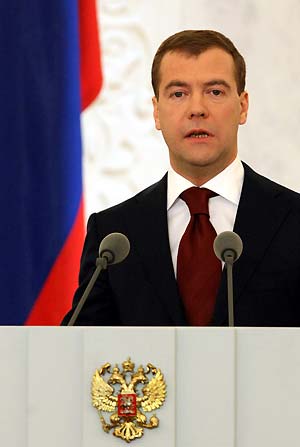Russian President Dmitry Medvedev on Wednesday delivered his first state-of-the-nation address at the Federal Assembly since taking office in May.
 |
|
Russian President Dmitry Medvedev delivers his first State of the Nation address to the Federal Assembly Kremlin in Moscow, capital of Russia, November 5, 2008.[Xinhua]
|
In a speech covering issues ranging from the conflict over South Ossetia to the global financial crisis, Medvedev's harsh tone confirmed the continuity of his predecessor Vladimir Putin's policies in his presidency.
National security
In the 85-minute speech broadcast live on television, Medvedev said Russia faces such threats and challenges as "the construction of a global missile defense system, the surrounding of Russia with military bases, unrestrained NATO expansion and other gifts."
Medvedev's hawkish tone delivered a clear message that Russia would respond to challenges from the West not just through diplomatic means.
In his view, the conflict in the Caucasus in August was used as a pretext to send NATO warships to the Black Sea and then to deploy the US anti-missile system in central Europe.
He said Russia will deploy a short-range missile system in its Baltic enclave of Kaliningrad bordering Poland and Lithuania, in response to US plans to set up a missile shield in the area.
"The Iskander missile system will be deployed in the Kaliningrad region to neutralize, when necessary, the (US) missile shield," he said.
Russia will also deploy equipment in its western region to electronically jam the U.S. missile defense system, said Medvedev, adding that resources of the Russian Navy will naturally be used to counter the missile shield.
He said Russia had cancelled its previous plans to take three missile regiments out of service in the central part of the country.
Medvedev added that Russia would not be drawn into an arms race, but would continue to ensure the security of its citizens.
"We will definitely not allow ourselves to be drawn into an arms race, but we are forced to take this into account."
Sending troops to South Ossetia was the first time Russia flexed its military muscles since the collapse of the Soviet Union in the early 1990s.
However, the Russian leadership will give priority to economic development instead of taking on a heavy burden of national defense, analysts believe.